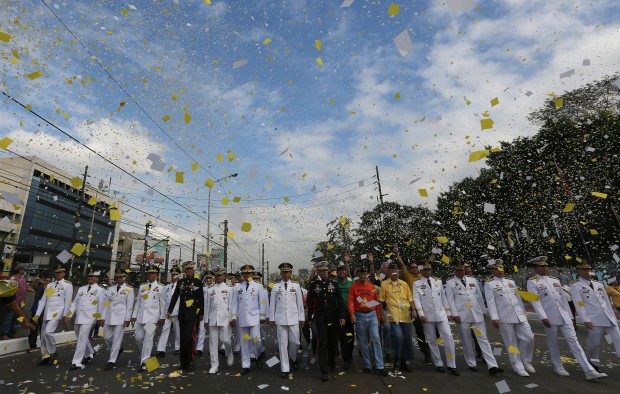PNP chief on Edsa: Leaders should serve, not abuse countrymen

Former President Fidel V. Ramos joins the members of the military during the reenactment of the Salubungan to mark the 30th anniversary celebration of the Edsa People Power revolution. JOAN S. BONDOC
The important lesson the country learned from the Edsa revolution was that Filipino leaders should never be given the right to abuse their countrymen, the current head of the police force said on Thursday, the anniversary of the People Power uprising in 1986.
“I think kahit na wala tayo doon sa 1986, we should still feel the relevance. The leaders should serve the people—that’s the important message of Edsa. Walang dahilan na abusuhin ng mga pinuno ang mga taong bayan,” Philippine National Police chief Director General Ricardo Marquez told reporters in a chance interview.
(I think that even if we weren’t there in 1986, we should still feel the relevance. The leaders should serve the people—that’s the important message of Edsa. There is no reason for leaders to abuse their countrymen.)
Marquez joined President Benigno Aquino III in the Edsa Experiential Museum set up inside the historic headquarters of the Armed Forces of the Philippines in Camp Aguinaldo, Quezon City.
The police force, composed of the defunct Philippine Constabulary, played a significant role through its chief former President Fidel V. Ramos. In 1986, Ramos got together with now Senator Juan Ponce Enrile, then the Defense minister, to call for the ouster of the late dictator Ferdinand Marcos.
Article continues after this advertisementREAD: What Ramos wants to tell millennials 30 years after Edsa revolt
Article continues after this advertisementSeeing soldiers and policemen mingling with ordinary citizens and church people was a nostalgic moment for the leader of the 160,000-strong PNP.
“During those days, that was an event very hard to happen but indeed it happened. They say things happen for a good reason and so we enjoy this freedom,” Marquez said.
During the Edsa revolution days, Marquez, having graduated from the Philippine Military Academy in 1982, was then a junior officer assigned in Palawan province.
“I was only a First Lieutenant in Palawan during the Edsa days. (I was monitoring the events) over the radio and television only,” he recalled.
Police and military generals led a march of some 2,000 troops of the PNP and AFP from Camp Aguinaldo to the People Power monument where the commemoration rites were held.
READ: Police, military reenact historic ‘salubungan’ at Edsa
This was a reenactment of the traditional “Salubungan” between Enrile and Ramos that led to the bloodless revolution that ended the two-decade long dictatorial rule of Marcos.
“We always demonstrate that when we are together, (the AFP and PNP), we are better. We can accomplish greater things,” Marquez said. CDG